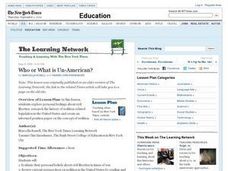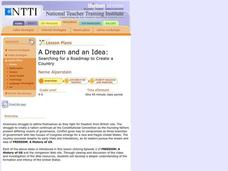Curated OER
Representation of the Common Citizen From Declaration of Independence to Present
Students create working definition of common citizen, and investigate and discuss important sections of Declaration of Independence, Articles of Confederation, U.S. Constitution, Bill of Rights, and other Amendments. Students demonstrate...
Curated OER
Who or What is Un-American?
Young scholars explore concepts about civil liberties, research the history of sedition-related legislation in the U.S. and create a position paper on the topic.
Judicial Learning Center
Types of Court Cases
How can one court acquit someone of a crime, while another convicts the person of the same one? It's all because of the differences between civil and criminal trials. An informative resource provides scholars in the field of criminology...
Center for Civic Education
Constitution Day Rap
Engage your class while learning about the US Constitution with this fun primary grade social studies lesson. After viewing a picture of the US Constitution, young learners piece together a US flag using stars and...
Curated OER
Just how broken is the Senate?
Twelfth graders examine the role of the Senate in the United States. In this American Government lesson, 12th graders read various articles and answer questions to these articles. Students write a letter to their Senator on a...
Curated OER
Successful Deaf Leaders in Government
Students create a "Who's Who" compilation of local, state, national and international leaders that advocate, introduce legislation, and lobby for the deaf. They use internet research to create a catalog of biographies and then conduct a...
Curated OER
Constitution of the United States: Crossword Puzzle
In this United States history worksheet, students use the 16 clues in order to fill in the crossword puzzle with the appropriate answers pertaining to the Constitution of the United States.
Curated OER
Fractured Facts for Civics
In this fractured facts for civics activity, 9th graders correct 24 sentences by replacing certain phrases if they are incorrect, but not all need to be corrected, answers are included.
Curated OER
Representing Our Nation
Students use pennies to illustrate how our states are represented in Congress. This lesson is to be implemented during a unit covering the branches of United States government.
Ohio Center For Law-Related Education
Four Activities: Thurgood Marshall and the Nomination and Confirmation of Federal Judges
The process of nominating and confirming federal judges can sound like a lot of bureaucratic hoops, but a resource breaks down the steps of the Supreme Court nominations in a simpler manner. Learners participate in four activities that...
Judicial Learning Center
The Power of Judicial Review
Marbury v. Madison is arguably the most important landmark case in the history of the Supreme Court. A fact-filled lesson provides background information about the case and two others related to the concept of judicial review. Scholars...
Judicial Learning Center
The Players in the Courtroom
Courtrooms are complicated. In addition to the many rules, there are a number of people whose jobs are not very clear to the casual courtroom observer. With the resource, individuals identify some of these roles and review more...
Judicial Learning Center
The Constitution
Supreme Court justices debate the meaning of the US Constitution, but we expect teachers to explain it to scholars with far less training and experience. A daunting task for sure, but it's not insurmountable with resources that simplify...
Curated OER
American History Through the Len of the Supreme Court Decisions
Students examine the historical background of Supreme Court decisions and the basic principles behind legislation. As part of the lesson plan, students discover legal concepts and terms and write sentences using the vocabulary they have...
Judicial Learning Center
About Federal Judges
Not just anybody can do the job of a federal judge, but according to the United States Constitution just about anybody can be appointed. The lesson outlines the process and requirements for becoming a federal judge, focusing on the...
C-SPAN
Choice Board: Expressed and Implied Powers
Article 1, Section 8 of the United States Constitution expressly lists powers given to Congress. Over the years, lawmakers have expanded the enumerated powers to include powers implied by the list. To better understand the significance...
Judicial Learning Center
Article III and the Courts
What's the best way to make sense of the Constitution? A helpful lesson contains both the text of Article III and annotation of each of its sections, breaking it down into easy-to-understand parts. It also includes links to a...
Judicial Learning Center
Your 1st Amendment Rights
Why should classes care about the First Amendment? An engaging lesson serves as a powerful tool for answering just that. As all four cases in the lesson relate directly to freedom of expression in schools, young scholars explore the...
C-SPAN
14th Amendment Equal Protection Clause
Two Supreme Court cases, Plessy v. Ferguson and Brown v. Board of Education take center stage in a lesson about the Equal Protection Clause of the 14th Amendment. Class members research both cases to compare and contrast the rulings.
Judicial Learning Center
The Judge and the Jury
Unless you are a lawyer, you might not understand just how unrealistic Law and Order and other legal dramas actually are. Here's a great resource to help scholars of criminology gain a more realistic perspective. The lesson outlines the...
National Endowment for the Humanities
George Washington: The Precedent President
Everyone knows that George Washington was the first president, but do your scholars know why that was so important? The lesson plan, the third in a sequence of three, allows learners to understand how George Washington set a precedent...
Curated OER
Who Gets the Job?
Students explore the process for presedential Cabinet appointments. They determine common characteristics found in members of the Cabinet.
Curated OER
Life before Congress
Students name some interesting backgrounds of Members of Congress, identify their current representatives in the legislative branch of the national government, and describe the background of one local representative or senator.
Curated OER
A Dream and an Idea: Searching for a Roadmap to Create a Country
Students compare and contrast opposing visions of government held by the founding fathers. They evaluate the roles of historical leaders in shaping the U.S. as an emerging nation.
Other popular searches
- U.s. Branches of Government
- U.s. Government (Branches)
- U.s. Government Branches
- U.s. Government 3 Branches























